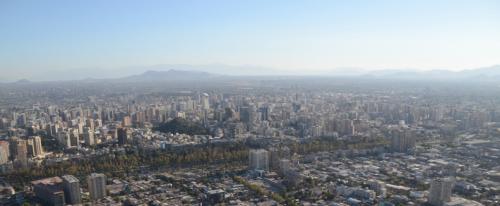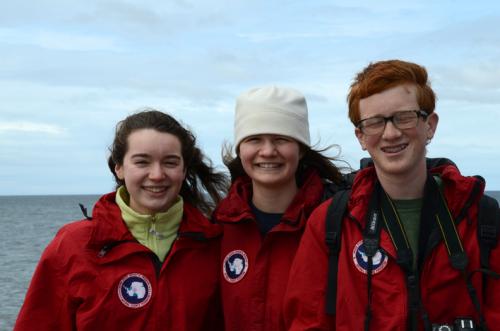We boarded the plane back to Madison. As we left behind the tall mountains around Santiago we pledged to do whatever we could do, that would bring us back to this magical land so we could finish the expedition. We did not make it to Antarctica and left many things unfinished, but even with that, we know we have been privileged to enjoy all sorts of amazing experiences. We returned home with a large number of memories collected during a very short period of time. It is hard to believe that we were gone just two weeks; that fourteen unforgettable days can transform me the way I feel transformed.

I now sit to digest and reflect on this transformation. It helps to have some space and time between Punta Arenas and Madison. I go back and read the notes I wrote back in November after we had selected the students for the team, to remind myself of the expectations I had at that point. Five things stand out from the collection of ideas I had. I was looking forward to:
- sharing the expedition with students,
- creating a solid team for the expedition,
- observing everybody’s cultural experience,
- Learning from the Chilean teachers, and
- Learning about scientific fieldwork in Antarctica.
I have been very excited about the possibility of sharing the adventure with students since the beginning of this project. I vividly remember thinking during my first PolarTREC expedition that took me to Antarctica, that the only way that experience could have improved would have been by bringing students and my family along. While in the middle of that research project, I was looking forward to sharing all the knowledge and excitement with my students back home, but I also knew it would be so much better if the students were there, next to me, seeing first hand the science we were doing. Now that we are back from Chile, I still look forward to sharing the experience of doing field research in Antarctica with students, as we did not get to do that this time, but I am also very happy to have shared with Anna, Claire and Luke our adventures in the far south. We learned a lot about Antarctic science from the Chilean researchers, teachers and students, through formal presentations and, perhaps more importantly, through the informal times that we shared with them. We learned a lot about the Chilean culture, and we learned a lot about ourselves. It has been very rewarding to see the face of amazement in my students as they discover new places and ideas. They grew so much as future scientists in a very short period of time.
More than an expectation, my goal of creating a solid team for the expedition was a concern. My previous PolarTREC experience had taught me the importance of having a team that would be able to write the stories of the trip, create videos and record the interviews. That experience also showed me that is is even more important to have a resilient team that could navigate choppy waters. I am very pleased by how Luke, Claire and Anna approached the experience and soaked up like sponges even the smallest details. We created a very capable and successful team that has been able to write the stories, is in the process of creating the videos and is planning on giving more presentations. This was not enough for a successful expedition. I also wanted to have a compassionate team in which we would all care for each other, and we would be able to provide support when needed. I was very impressed to see us all supporting each other during the uncertain times that came as we waited to hear about the fate of the expedition. It was rough for all of us to see Luke feeling bad; no teacher wants to end up with a student in a clinic when traveling abroad, and no student wants to end up with an IV in the emergency room of a foreign land. The team building work we did before departing for Chile proved to be more important than I thought it would be.

I cannot be happier with the results of the cultural experience for all of us. A lot of the credit should go to the amazing friends we met in Chile. Warm people full of curiosity, eager to share and learn. The Chilean students were kind and considerate when sharing their projects with us, the teachers were inspiring and humble, and the researchers were wise and patient. I am equally impressed by Claire, Luke and Anna; they were able to work amazingly well with the groups from Chile, even with some cultural and language differences, and under stressful conditions. It was very rewarding for me to see them working together in the biochemistry lab at INACH, for example, and realize that even when the instructions for some complicated lab experiments were in Spanish, they were all able to carry on the science with joy. It was definitely a trip highlight to see our students create very strong bonds with the host students, as they found science to be their common language. I still wonder about the unmet possibilities of them working together in Antarctica; I am sure that would have been something very special!

Back in November I was also looking forward to meeting the teachers and researchers from Chile. I had read about their projects on INACH’s website and was amazed at the complexity of their projects. I wanted to learn from the teachers the motivational art that allows them to guide students through their research pieces. I was extremely impressed with the work of the chilean students and teachers. Teachers were very warm and supportive, and the students were very strong and prepared. I now look forward to applying what I learned in Punta Arenas with my own students, and guide my students through real and complex science processes.
I am very pleased with the whole experience, but there are important unmet goals for which we will continue to work. After seeing what took place in Punta Arenas and Santiago, I know the potential of what could have happened for all these students had we reached Antarctica. I want to see Claire, Luke and Anna doing Antarctic fieldwork in collaboration with the amazing students, teachers and researchers we met in Chile. We will continue to work towards fulfilling the pledge we made as we left Santiago. The road to Antarctica is not an easy one, but it will be worth it all the effort once we get there.



Comments